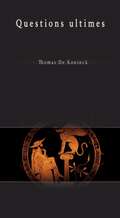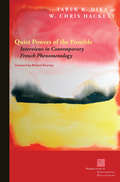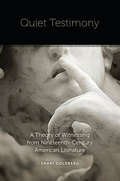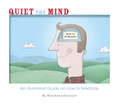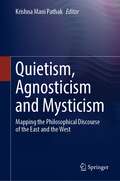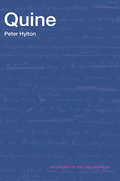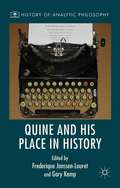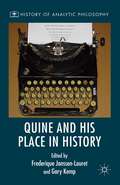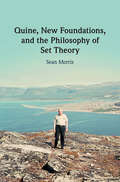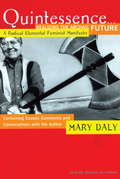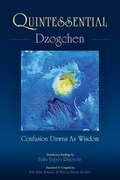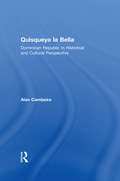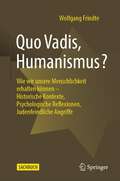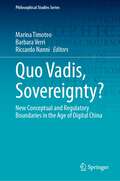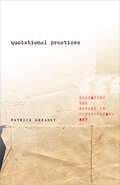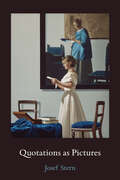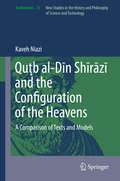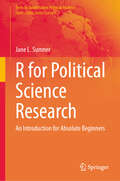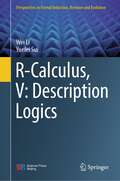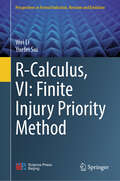- Table View
- List View
Questions ultimes (Philosophica)
by Thomas De KoninckLe premier défi de la démocratie est de donner le «goût de l’avenir» (Alexis de Tocqueville), de générer l’enthousiasme qui poussera les jeunes d’esprit à progresser d’eux-mêmes vers de nouvelles quêtes de sens et de savoir, à renouveler peut-être surtout, dans le contexte des nouvelles connaissances et d’une prise de conscience accrue des richesses des différentes cultures, les questions que l’on appelle «ultimes et les plus hautes», pour citer Husserl, celles que la science exclut par principe et qui sont pourtant «les questions les plus brûlantes», portant «sur le sens ou sur l’absence de sens de toute cette existence humaine». Le simple mot question évoque d'emblée le vieux français queste, c'est-à-dire la quête, du latin quaerere, «rechercher», «aimer»; il traduit le désir de voir et de savoir, impliquant du coup les deux dimensions à la fois les plus essentielles et les plus grandes de notre être proprement humain, la capacité d’aimer et celle de penser. Une éducation qui exclurait, comme tranchées d’avance, ces questions ultimes, ne serait nullement à la hauteur de l’humain. Les essais composant ce livre explorent six d’entre elles, à savoir la dignité humaine, l’intelligence, la liberté, le bonheur, la mort et la beauté. Découvrez la version livre audio de ce titre, lu en version intégrale par Étienne Panet-Raymond. Publié en français
Quiet Beauty
by Kendall H. Brown David M. CobbQuiet Beauty: Japanese Gardens of North America is an extraordinary look at the most beautiful-and serene-gardens in the United States and Canada. Most Japanese garden books look to the gardens of Japan. Quiet Beauty explores the treasure trove of Japanese gardens located in North America. Featuring an intimate look at twenty-six gardens, with numerous stunning color photographs of each, that detail their style, history, and special functions, this book explores the ingenuity and range of Japanese landscaping.Gardens include: Japanese Tea Garden in Golden Gate Park, San Francisco, California Nitobe Memorial Garden, University of British Columbia, Vancouver, British Columbia Japanese Garden, Fort Worth Botanic Garden, Texas Garden of the Pine Winds, Denver Botanic Gardena, Colorado Japanese Garden, Montréal Botanical Garden, Québec Tenshin'en (The Garden of the Heart of Heaven), Museum of Fine Arts, Boston, Massachusetts Roji'en (Garden of Drops of Dew), The George D. and Harriet W. Cornell Japanese Gardens, The Morikami Museum and Japanese Gardens, Delray Beach, Florida Japanese Friendship Garden of Phoenix, Margaret T. Hance Park, Arizona Garden of the Pine Wind, Garven Woodland Garden, Hot Springs, Arkansas
Quiet Methodologies: Humility in the Humanities
by Suzanne BostReimagining humanities scholarship with humility and inclusive attention How might foregrounding the writings of colonized peoples transform the ways we work in the humanities? In an era dominated by loud political rhetoric, Suzanne Bost advocates for quieter modes of scholarship: intellectual humility rather than ego, collaboration and conversation rather than singular argumentation, continual reflection and revision rather than defensiveness, and a willingness to believe in different ways of being and knowing rather than adhering to academic norms. With Quiet Methodologies, she demonstrates practical decolonial scholarship and proposes alternative approaches for fostering meaningful engagement. Turning to feminist, queer, and decolonial writings from Gloria Anzaldúa, Alexis Pauline Gumbs, Audre Lorde, and many others, Bost reflects on what we do when we work with literature, culture, and ideas. She weaves together multiple voices, methods of writing, and culturally diverse epistemologies and uses creative devices such as collage, her own original poetry, revision, lists, images, and conversation to disengage academic thought and writing from colonial theories and archives that have passed as neutral. Eschewing conventional monograph formats, her work embraces a reciprocal and heterogeneous learning process with profound ethical implications. Part of a movement of reimagining research and education through care, Quiet Methodologies is a powerful exploration of the possibilities of criticism during crises. It encourages readers to be visionary and pragmatic, challenging current conditions and offering alternative ideas for the future of the humanities. Retail e-book files for this title are screen-reader friendly with images accompanied by short alt text and/or extended descriptions.
Quiet Powers of the Possible: Interviews in Contemporary French Phenomenology (Perspectives in Continental Philosophy)
by Tarek R. Dika W. Chris HackettQuiet Powers of the Possible offers an excellent introduction to contemporary French phenomenology through a series of interviews with its most prominent figures.Guided by rigorous questions that push into the most important aspects of the latest phenomenological research, the book gives readers a comprehensive sense of each thinker’s intellectual history, motivations, and philosophical commitments.The book introduces readers to debates that have not previously been accessible to the English-speaking world, such as the growing interest in the phenomenological concept of life in its affective and even vital dimensions, the emerging dialogue with the analytic philosophy of mind and language, and reassessments of the so-called theological turn.The diversity of approaches collected here has its origin in a deeper debate about the conceptual and historical foundations of phenomenology itself. In this way the book offers the most accessible and wide-ranging introduction to French phenomenology to have appeared in the English-speaking world to date.
Quiet Rumours
by Emma Goldman Dark Star Collective Roxanne Dunbar-Ortiz Jo Freeman Voltairine De CleyreThis is a fascinating window into the development of the women's movement in the words of those who moved it. Compiled and introduced by the UK-based anarchist-intellectual collective Dark Star, Quiet Rumours features articles and essays from four generations of anarchist-inspired feminists, including Emma Goldman, Voltairine de Cleyre, Jo Freeman, Peggy Kornegger, Cathy Levine, Roxanne Dunbar-Ortiz, Mujeres Creando, Rote Zora, and beyond. All the pieces from the first two editions are included here, as well as new material bringing third and so-called fourth-wave feminism into conversation with twenty-first century politics. An ideal overview for budding feminists and an exciting reconsideration for seasoned radicals.
Quiet Testimony: A Theory of Witnessing from Nineteenth-Century American Literature
by Shari GoldbergThe nineteenth century was a time of extraordinary attunement to the unspoken, the elusively present, and the subtly haunting. Quiet Testimony finds in such attunement a valuable rethinking of what it means to encounter the truth. It argues that four key writers—Emerson, Douglass, Melville, and Henry James—open up the domain of the witness by articulating quietude’s claim on the clamoring world.The premise of quiet testimony responds to urgent questions in critical theory and human rights. Emerson is brought into conversation with Levinas, and Douglass is considered alongside Agamben. Yet the book is steeped in the intellectual climate of the nineteenth century, in which speech and meaning might exceed the bounds of the recognized human subject. In this context, Melville’s characters could read the weather, and James’s could spend an evening with dead companions.By following the path by which ostensibly unremarkable entities come to voice, Quiet Testimony suggests new configurations for ethics, politics, and the literary.
Quiet the Mind
by Matthew JohnstoneIn a world where finding even ten minutes to 'do nothing' can be difficult, the benefits of meditation can be profound. Meditation is simply a way of giving our brains a well-deserved break and can actually help our brains to function healthily and happily. This beautifully illustrated guide is an inspiring and practical book which shows you how to meditate without the need for uncomfortable lotus positions or prayer beads! With his typical gentle and insightful humour, Matthew's guide to meditation will enable to you to feel more present, more youthful, have more energy and greater concentration, improve your mood and sleep more soundly.
Quietism, Agnosticism and Mysticism: Mapping the Philosophical Discourse of the East and the West
by Krishna Mani PathakThis book presents a unique collection of papers on various philosophical aspects of the unknown and unvoiced truth and reality of the cosmic world. It offers a systematic analysis of the three philosophical theories of Quietism, Agnosticism and Mysticism and introduces readers to the fundamentals of mystical knowledge claimed by philosophical schools of the east and the west. It discusses, debates and deliberates on philosophical issues concerning the acquisition of truth, its objectivity and its various dimensions along with the application of thoughts pertaining to Quietism, Agnosticism, and metaphysical-mystic traditions in philosophy. It examines and precisely defines the scope and limits of knowledge, the respective way of life, its expressions and morality, mystical revelation, ineffability of the ultimate, value realism, and faith and reason - with a primary focus on the classical Indian schools of Hinduism, Buddhism, Jainism, Agnosticism, the Bāuls, Greek traditions, modern western meta-philosophy, and contemporary quietist debate in religion and theology. This insightful collection should be of great interest to independent researchers, students and teachers of philosophy, theology, Mysticism and Agnosticism, cultural studies and religious studies.
Quine (Arguments of the Philosophers)
by Peter HyltonQuine was one of the foremost philosophers of the Twentieth century. In this outstanding overview of Quine's philosophy, Peter Hylton shows why Quine is so important and how his philosophical naturalism has been so influential within analytic philosophy. Beginning with an overview of Quine's philosophical background in logic and mathematics and the role of Rudolf Carnap's influence on Quine's thought, he goes on to discuss Quine's famous analytic-synthetic distinction and his arguments concerning the nature of the a priori. He also discusses Quine's philosophy of language and epistemology, his celebrated theory of the indeterminacy of translation and his broader views of ontology and modality. This book is essential reading for anyone interested in Quine, twentieth century philosophy and the philosophy of language.
Quine and His Place in History (History of Analytic Philosophy)
by Gary Kemp Frederique Janssen-LauretQuine and His Place in History.
Quine and His Place in History (History of Analytic Philosophy)
by Gary Kemp Frederique Janssen-LauretContaining three previously unpublished papers by W.V. Quine as well as historical, exegetical, and critical papers by several leading Quine scholars including Hylton, Ebbs, and Ben-Menahem, this volume aims to remedy the comparative lack of historical investigation of Quine and his philosophical context.
Quine, New Foundations, and the Philosophy of Set Theory
by Sean MorrisQuine's set theory, New Foundations, has often been treated as an anomaly in the history and philosophy of set theory. In this book, Sean Morris shows that it is in fact well-motivated, emerging in a natural way from the early development of set theory. Morris introduces and explores the notion of set theory as explication: the view that there is no single correct axiomatization of set theory, but rather that the various axiomatizations all serve to explicate the notion of set and are judged largely according to pragmatic criteria. Morris also brings out the important interplay between New Foundations, Quine's philosophy of set theory, and his philosophy more generally. We see that his early technical work in logic foreshadows his later famed naturalism, with his philosophy of set theory playing a crucial role in his primary philosophical project of clarifying our conceptual scheme and specifically its logical and mathematical components.
Quintessence...Realizing the Archaic Future: A Radical Elemental Feminist Manifesto
by Mary Daly"Suffused with her inimitable word play and stunning intelligence, and embodying a balance of mysticism and critical theory, Daly's clarion call to uncover the quintessence of the universe is quite an intriguing tune." -On the Issues
Quintessence: Basic Readings from the Philosophy of W. V. Quine
by Willard Van QuineThrough the first half of the twentieth century, analytic philosophy was dominated by Russell, Wittgenstein, and Carnap. Influenced by Russell and especially by Carnap, another towering figure, Willard Van Orman Quine (1908–2000) emerged as the most important proponent of analytic philosophy during the second half of the century. Yet with twenty-three books and countless articles to his credit—including, most famously, Word and Object and "Two Dogmas of Empiricism"—Quine remained a philosopher's philosopher, largely unknown to the general public. Quintessence for the first time collects Quine's classic essays (such as "Two Dogmas" and "On What There Is") in one volume—and thus offers readers a much-needed introduction to his general philosophy. Divided into six parts, the thirty-five selections take up analyticity and reductionism; the indeterminacy of translation of theoretical sentences and the inscrutability of reference; ontology; naturalized epistemology; philosophy of mind; and extensionalism. Representative of Quine at his best, these readings are fundamental not only to an appreciation of the philosopher and his work, but also to an understanding of the philosophical tradition that he so materially advanced.
Quintessential Dzogchen: Confusion Dawns as Wisdom
by Erik Pema Kunsang Marcia Binder Schmidt Tulku UrgyenThis hands-on guidebook adapts the Dzogchen path for the modern student while adhering to traditional principles. The book is based on the direct, accessible style of Tulku Urgyen Rinpoche and offers a thorough grounding in how to study, contemplate, and meditate in this rich spiritual environment. Guided by an introductory teaching by Rinpoche, as well as 42 selected teachings from great Dzogchen masters, readers learn to access the pure, clear awareness that lies hidden under the constant flow of anxious thoughts.From the Trade Paperback edition.
Quisqueya la Bella: Dominican Republic in Historical and Cultural Perspective (Perspectives On Latin America And The Caribbean Ser.)
by Alan CambeiraA history of the Dominican Republic from pre-Columbian times to the present. The book focuses on the merger of three cultures across time - the indiginous cultures of the Caribbean, the Iberians of southern Europe and the Africans.
Quo Vadis, Humanismus?: Wie wir unsere Menschlichkeit erhalten können - Historische Kontexte, Psychologische Reflexionen, Judenfeindliche Angriffe
by Wolfgang FrindteWie steht es mit den humanistischen Grundlagen unseres Lebens und Zusammenlebens? Müssen wir uns nicht gerade heute dieser Fundamente versichern? Wer greift diese Fundamente an? Um diese Fragen beantworten zu können, nutzt der Autor ein Konstruktionsprinzip, mit dem die humanistischen Anstrengungen seit Petrarca in dreifacher Weise gerahmt werden: Zum einen werden diese Anstrengungen in die jeweiligen historischen Kontexte eingeordnet; zum zweiten greift er auf Reflexionen zurück, die sich in den verschiedenen Entwicklungsetappen der Psychologie explizit oder implizit auf den Humanismus beziehen; drittens schließlich macht er auf judenfeindliche und antisemitische Äußerungen, Vorurteile, Diskriminierungen und Vernichtungsexzesse aufmerksam, um die Ambivalenzen der verschiedenen humanistischen Anstrengungen zu verdeutlichen. Denn, so der Autor, die Einstellung und das Verhalten gegenüber Jüdinnen und Juden sind der Lackmustest eines jeglichen Humanismus.
Quo Vadis, Sovereignty?: New Conceptual and Regulatory Boundaries in the Age of Digital China (Philosophical Studies Series #154)
by Marina Timoteo Barbara Verri Riccardo NanniThis book presents an interdisciplinary exploration of digital sovereignty in China, which are addressed mainly from political, legal and historical point of views. The text leverages a large number of native Chinese experts among the authors at a time when literature on China’s involvement in internet governance is more widespread in the so-called “West”. Numerous Chinese-language documents have been analysed in the making of this title and furthermore, literature conceptualising digital sovereignty is still limited to journal articles, making this one of the earliest collective attempts at defining this concept in the form of a book. Such characteristics position this text as an innovative academic resource for students, researchers and practitioners in international relations (IR), law, history, media studies and philosophy.
Quotational Practices: Repeating the Future in Contemporary Art
by Patrick GreaneyLiterature and art have always depended on imitation, and in the past few decades quotation and appropriation have become dominant aesthetic practices. But critical methods have not kept pace with this development. Patrick Greaney reopens the debate about quotation and appropriation, shifting away from naïve claims about the death of the author. In interpretations of art and literature from the 1960s to the present, Quotational Practices shows how artists and writers use quotation not to undermine authorship and originality, but to answer questions at the heart of twentieth-century philosophies of history.Greaney argues that quotation is a technique employed by art and philosophy to build ties to the past and to possible futures. By exploring quotation&’s links to gender, identity, and history, he offers new approaches to works by some of the most influential modern and contemporary artists, writers, and philosophers, including Walter Benjamin, Guy Debord, Michel Foucault, Marcel Broodthaers, Glenn Ligon, Sharon Hayes, and Vanessa Place.Ultimately, Quotational Practices reveals innovative perspectives on canonical philosophical texts as well as art and literature in a wide range of genres and mediums—from concrete poetry and the artist&’s book to performance, painting, and video art.
Quotations as Pictures
by Josef SternThe proposal of a semantics for quotations using explanatory notions drawn from philosophical theories of pictures. In Quotations as Pictures, Josef Stern develops a semantics for quotations using explanatory notions drawn from philosophical theories of pictures. He offers the first sustained analysis of the practice of quotation proper, as opposed to mentioning. Unlike other accounts that treat quotation as mentioning, Quotations as Pictures argues that the two practices have independent histories, that they behave differently semantically, that the inverted commas employed in both mentioning and quotation are homonymous, that so-called mixed quotation is nothing but subsentential quotation, and that the major problem of quotation is to explain its dual reference or meaning—its ordinary meaning and its metalinguistic reference to the quoted phrase attributed to the quoted subject. Stern argues that the key to understanding quotation is the idea that quotations are pictures or have a pictorial character. As a phenomenon where linguistic competence meets a nonlinguistic symbolic ability, the pictorial, quotation is a combination of features drawn from the two different symbol systems of language and pictures, which explains the exceptional and sometimes idiosyncratic data about quotation. In light of this analysis of verbal quotation, in the last chapters Stern analyzes scare quotation as a nonliteral expressive use of the inverted commas and explores the possibility of quotation in pictures themselves.
Quṭb al-Dīn Shīrāzī and the Configuration of the Heavens: A Comparison of Texts and Models
by Kaveh NiaziAs a leading scientist of the 13th century C. E. Quṭb al-Dīn Shīrāzī wrote three substantial works on hay'a (or the configuration of the celestial orbs): Nihāyat al-idrāk fī dirāyat al-aflāk ("The Limits of Attainment in the Understanding of the Heavens"), al-Tuḥfa al-shāhīya fī 'ilm al-hay'a ("The Royal Offering Regarding the Knowledge of the Configuration of the Heavens"), and Ikhtīyārāt-i Muẓaffarī ("The Muẓaffarī Elections"). Completed in less than four years and written in two of the classical languages of the Islamic world, Arabic and Persian, these works provide a fascinating window to the astronomical research carried out in Ilkhanid Persia. Shīrāzī and his colleagues were driven by their desire to rid Ptolemaic astronomy from its perceived shortcomings. An intriguing trail of revisions and emendations in Shīrāzī's hay'a texts serves to highlight both those features of Shīrāzī's astronomy that were inherited from his predecessors, as well as his original contributions to this branch of astronomical research. As a renowned savant, Shīrāzī spent a large portion of his career near centers of political power in Persia and Anatolia. A study of his scientific output and career as a scholar is an opportunity, therefore, for an examination of the patronage of science and of scientific works within the Ilkhanid realms. Not only was this patronage important to the work of scholars such as Shīrāzī but it was critical to the founding and operation of one of the foremost scientific institutions of the medieval Islamic world, the Marāgha observatory. The astronomical tradition in which Shīrāzī carried out his research has many links, as well, to the astronomy of Early Modern Europe, as can be seen in the astronomical models of Copernicus.
R for Political Science Research: An Introduction for Absolute Beginners (Texts in Quantitative Political Analysis)
by Jane L. SumnerThis text teaches basic R skills to political science students with no programming background. Intended specifically for the students who need to learn R for a class and who have no interest in R or may even be afraid of or hostile to it, this text builds an awareness of basics, confidence, and a skill set necessary to transition into more advanced texts. To that end, in addition to standard topics, this book includes three chapters specific to the new or reluctant learner. The Introduction explicitly sets expectations for how to use the book and discusses fixed and growth mentalities, and why a growth mentality is crucial for learning R. Chapter 1 includes some basic information on programming, R, and their place in political science research. Chapter 2 explicitly discusses errors, warnings, and methods of debugging. Further chapters build on this by including new errors or warnings that students may encounter as they progress. In service of the aim to give students a solid foundation in R and awareness of what it is and can do, this book teaches and uses both tidyverse and base R frameworks throughout. After completing the book, students should be prepared to learn more advanced materials.
R-Calculus, V: Description Logics (Perspectives in Formal Induction, Revision and Evolution)
by Wei Li Yuefei SuiThis book series consists of two parts, decidable description logics and undecidable description logics. It gives the R-calculi for description logics. This book offers a rich blend of theory and practice. It is suitable for students, researchers and practitioners in the field of logic.
R-Calculus, VI: Finite Injury Priority Method (Perspectives in Formal Induction, Revision and Evolution)
by Wei Li Yuefei SuiThis sixth volume of the book series applies finite injury priority method to R-calculi and obtain (in)completeness theorem for binary-valued, Post three-valued, B2^2-valued and L4-valued first-order logics, and extend the method to infinite injury priority method and 0"-method for default logic to produce pseudo-extensions of a default theory, corresponding to different R-calculi. Finite injury priority method and tree constructions are discussed in this book. This book offers a rich blend of theory and practice. It is suitable for students, researchers and practitioners in the field of logic.
